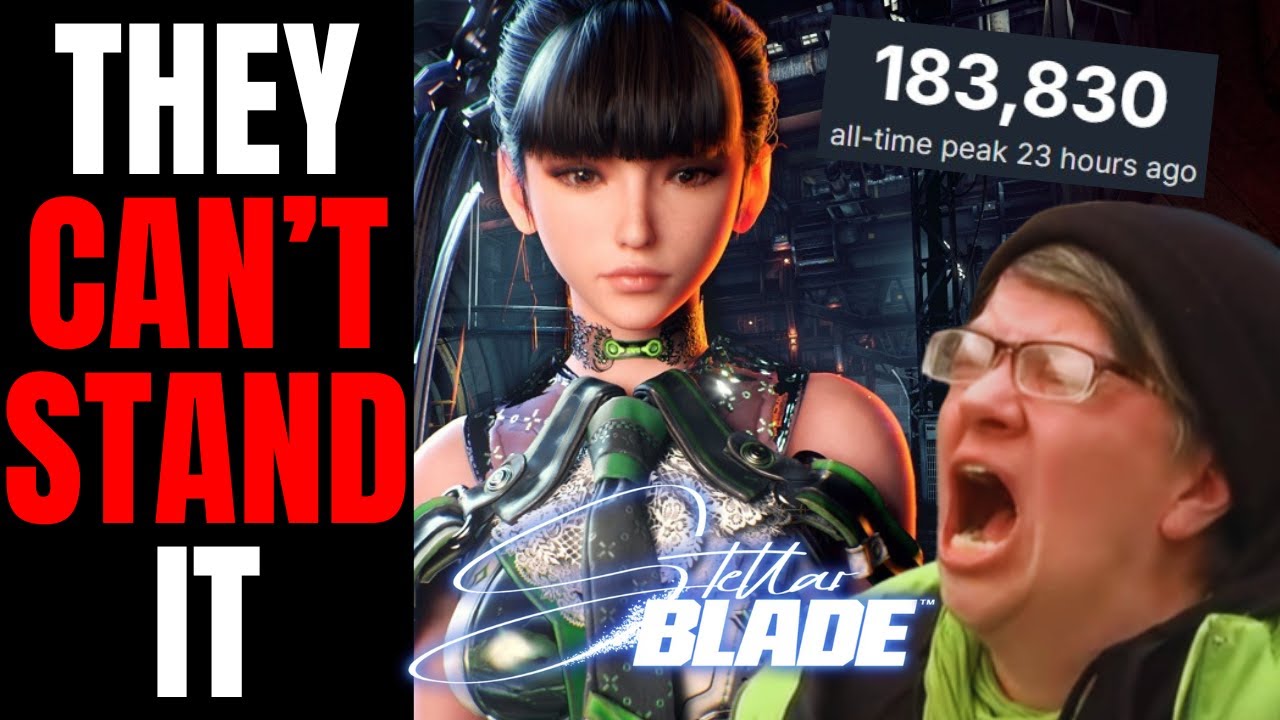Stellar Blade’s PC Launch Is BREAKING the Internet! 😲
Gamers are obsessed with Stellar Blade’s record-smashing debut.
But why are some journalists fuming?
Is this a win for players or a culture war explosion?
Dive into the drama—click to find out! 👇

Stellar Blade, the action RPG from South Korean studio Shift Up, has cemented its place as a gaming phenomenon with its PC launch on June 11, 2025. The game shattered records, achieving a peak of 188,576 concurrent players on Steam, outpacing all previous Sony-published single-player titles like Marvel’s Spider-Man Remastered (66,436) and God of War (73,529). X posts, such as @DavidHarvey_SC’s claim that “Games Journalists FURIOUS At Gamers After Stellar Blade BREAKS RECORDS,” frame the success as a rebuke to “woke” critics, alleging journalists are melting down over the game’s popularity and protagonist Eve’s sexualized design. But is this narrative accurate, or is it an exaggerated culture war talking point? This article examines Stellar Blade’s PC success, the alleged journalist backlash, and the broader gaming culture dynamics, drawing on reports, X sentiment, and critical analysis.
The PC Launch: A Record-Breaking Phenomenon
Stellar Blade’s PC debut was a masterclass in execution. Released after a year of PlayStation 5 exclusivity, the game hit Steam with a peak of 104,311 concurrent players within hours, climbing to 188,576 by June 14, 2025, per SteamDB. This surpassed Sony’s single-player PC records, trailing only the multiplayer Helldivers 2 (458,709). Vice reported the game’s 92.5% “Very Positive” rating from 19,000+ Steam reviews, with players praising its NieR: Automata-inspired combat, stunning visuals, and Eve’s customizable outfits. The port’s technical polish—DLSS 4, ultrawide support, and unlocked frame rates—earned accolades, while mods, including risqué skins, exploded within hours, per VideoGamer.
Shift Up’s strategic moves fueled the hype. A May 30, 2025, demo drew 26,443 players, pushing the game to Steam’s 9th most-wishlisted title, per GuruGamer. The studio lifted Sony’s region lock, making Stellar Blade accessible in 100 countries, a rare move that boosted its global reach, as noted on Push Square. A NieR: Automata crossover and VR mode, promoted with combat-focused (but subtly suggestive) trailers, kept buzz high. Financially, the game’s success is undeniable: Shift Up’s 2024 revenue hit $151.4 million, with $43.2 million from Stellar Blade royalties, greenlighting a sequel and new IP, per company reports.
The “Furious” Journalists: Fact or Fabrication?
The narrative of “woke games journalists furious” stems from X posts and YouTube videos, like one titled “Games Journalists FURIOUS At Gamers After Stellar Blade BREAKS RECORDS” (June 14, 2025). Users like @Providence_777 claim journalists “tried everything” to make the game fail because it caters to players’ desires, while @MrRomyRome alleges “unhinged woke left media” are in tears. These posts point to earlier controversies, particularly around Eve’s sexualized design, as evidence of ongoing journalist hostility.
The backlash traces to Stellar Blade’s 2024 PS5 launch, when outlets like IGN France criticized Eve as a “sexualized doll” designed by someone who “never saw a woman,” prompting a swift apology after fans noted her model, Shin Jae-eun, is a real South Korean actress. Kotaku and GamesRadar critiqued Eve’s revealing outfits as “sleazy” or clashing with the game’s serious tone, sparking accusations of “woke” bias on Reddit’s r/KotakuInAction. However, most reviews were positive, with Metacritic’s 81/100 score praising the game’s combat and visuals. TheGamer, in a March 2024 piece, argued Eve’s design fits the game’s aesthetic, likening her to Bayonetta and 2B, and dismissed the “culture war” as overblown.
Post-PC launch, evidence of journalist “fury” is scarce. Vice’s June 13, 2025, article focused on the “thirsty” fanbase, humorously noting Steam reviews like “This wasn’t a gaming session. This was a spiritual awakening wrapped in latex.” Push Square celebrated the game’s 152,000+ concurrent players, calling it a “new record for Sony.” GuruGamer praised the launch as proof the industry should “ditch woke nonsense,” but cited no specific journalist meltdowns, instead referencing general “woke” trends. X posts claiming “attacks” from journalists, like @RealHypnotic1’s, lack direct quotes or articles, suggesting the outrage is more performative than substantiated.
The Culture War Narrative: A Self-Fulfilling Prophecy?
The “woke journalists vs. gamers” framing is a recurring trope, amplified by Stellar Blade’s Eve, whose skintight suit and “jiggle physics” were both celebrated and criticized. Fans on X and Reddit’s r/stellarblade hail the game as a victory over “woke” censorship, with comments like “This is a middle finger to the woke weirdos.” Shift Up’s refusal to tone down Eve’s design, coupled with uncensored outfits post-launch, fueled this sentiment, as seen in a May 2024 YouTube video titled “Stellar Blade Releases UNCENSORED Outfits After Gamers Fight Back.” The game’s success—3 million units sold across PS5 and PC, per Shift Up—is framed as proof that gamers, particularly men (60% of PC gamers, per 2024 Statista), prefer “fun” and “sexy” over “preachy” designs.
Critics of this narrative, like r/Gamingcirclejerk, argue it’s a manufactured war. A 2024 post mocked “anti-woke chuds” for ignoring Stellar Blade’s inspiration from a labor strike, a “woke” theme, and suggested the outrage is less about journalism and more about validating biases. TheGamer’s 2024 article noted that journalists don’t oppose Eve’s design en masse, citing support for similar characters like Tifa (Final Fantasy VII). Den of Geek’s February 2024 piece called the controversy a “lightning rod” for existing political divides, not a genuine debate about the game.
The “woke” label often misrepresents critiques. Kotaku’s review acknowledged Eve’s appeal but argued her sexualization felt forced, not that it was inherently wrong. IGN’s apology for its France branch’s comments shows sensitivity to backlash, not fury at gamers. Claims of journalists “attacking” the PC launch, as in @SmashJT’s post, lack specific examples, suggesting the narrative is driven by a vocal minority projecting past grievances onto the present.
Why Stellar Blade Succeeded: Beyond the Controversy
While the culture war narrative grabs headlines, Stellar Blade’s success is multifaceted:
Gameplay and Polish: The game’s Sekiro-inspired combat, deep skill trees, and responsive mechanics earned praise from PCMag (Editors’ Choice) and IGN (7/10). Its PC port’s optimization—unlike The Last of Us: Part 1’s buggy launch (36,496 peak)—drove adoption.
Fan Service and Modding: Eve’s customizable outfits, from sleek to risqué, and rapid mod creation (hundreds within hours) catered to a “thirsty” fanbase, per Vice. Steam reviews like “I logged in for combos, but stayed for the bounce” highlight this draw.
Market Timing: Stellar Blade capitalized on flops like Concord (shut down after two weeks) and Dragon Age: The Veilguard (61,360 peak), which faced “woke” backlash for diverse casts, per GuruGamer. Its apolitical stance and Asian market appeal, boosted by Black Myth: Wukong’s 2.2 million peak, filled a demand.
Marketing Savvy: Shift Up’s demo, VR mode, and global accessibility (no region lock) kept hype alive. The NieR crossover and May 15, 2025, release date reveal sustained momentum, per Push Square.
The controversy, while amplifying visibility, wasn’t the sole driver. X posts like @Providence_777 claim gamers “won” by supporting Stellar Blade, but the game’s quality and strategic execution were equally critical.
The Bigger Picture: Gaming’s Cultural Divide
The Stellar Blade saga reflects gaming’s ongoing culture war, where “woke” and “anti-woke” camps clash over representation, censorship, and art. Supporters, like those on r/KotakuInAction, see Eve as a return to “traditional” designs, free from DEI (diversity, equity, inclusion) agendas, and cite flops like Assassin’s Creed Shadows as evidence. Critics, per r/Gamingcirclejerk, argue this obsession with “hot” characters ignores gameplay and story, turning Eve into a political symbol rather than a protagonist.
Journalists aren’t a monolith. While some, like IGN France, misstepped, others embraced Stellar Blade’s aesthetic. The “furious” narrative, pushed by X posts and YouTube, exaggerates isolated critiques into a grand conspiracy, echoing 2014’s Gamergate. Shift Up’s success—$151.4 million in revenue—shows studios can thrive by focusing on quality and audience desires, but the industry’s divide persists. Western developers like BioWare face scrutiny for “woke” designs, while Asian studios like Shift Up and Game Science (Black Myth: Wukong) gain traction by sidestepping these debates.
Conclusion: A Triumph, Not a War
Stellar Blade’s PC launch is a triumph, breaking records with 188,576 concurrent players and proving Shift Up’s formula—polished gameplay, bold aesthetics, and fan-focused marketing—resonates. The claim of “woke games journalists furious” is largely overstated, rooted in 2024 controversies and amplified by X posts and YouTube videos lacking concrete evidence of post-launch meltdowns. While Eve’s design sparked debate, most journalists praised the game, and the “culture war” narrative is driven more by fans and content creators than by widespread media outrage.
The game’s success sends a message: players value fun, quality, and escapism over political agendas, but pinning it solely on “anti-woke” sentiment oversimplifies its appeal. As Shift Up plans a sequel, Stellar Blade stands as a case study in navigating gaming’s fractured landscape—winning by delivering what players want, not by fighting ghosts of “woke” journalism.





